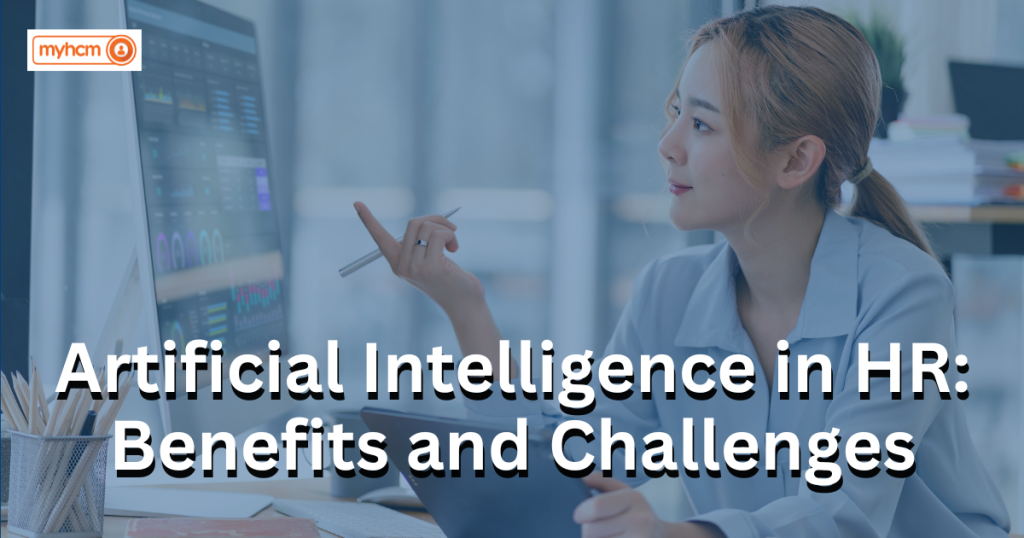Artificial Intelligence (AI) is making waves in Human Resources (HR). AI in HR offers transformative benefits and presents unique challenges. Embracing AI can streamline HR processes, enhance decision-making, and improve employee experiences. However, integrating AI also brings challenges that organizations must address. Understanding the benefits and challenges of AI in HR is essential for leveraging its full potential.
The Benefits of AI in HR
AI in HR provides numerous benefits. Firstly, AI enhances efficiency by automating routine tasks. Tasks such as resume screening, scheduling interviews, and processing payroll can be streamlined with AI tools. This automation saves time and reduces human error. Additionally, AI improves decision-making by analyzing vast amounts of data. Predictive analytics can identify trends and insights that help HR professionals make informed decisions. Furthermore, AI enhances employee experiences through personalized interactions and support. Thus, the benefits of AI in HR include increased efficiency, better decision-making, and improved employee engagement.
Streamlining Recruitment with Artificial Intelligence AI
AI revolutionizes recruitment processes. AI tools can quickly sift through resumes and identify the best candidates. This capability speeds up the hiring process and ensures that top talent is not overlooked. AI-driven recruitment platforms use algorithms to match candidates’ skills with job requirements. This results in a more precise and efficient hiring process. Additionally, AI can assist in creating targeted job advertisements and optimizing recruitment strategies. Therefore, the role of AI in recruitment is crucial for enhancing efficiency and effectiveness.
Improving Employee Onboarding with Artificial Intelligence AI
AI also plays a significant role in improving employee onboarding. Automated onboarding systems can guide new hires through the process, providing them with essential information and training resources. AI can personalize onboarding experiences based on the new employee’s role and preferences. This tailored approach helps new hires integrate smoothly and feel welcomed. Moreover, AI-driven analytics can track onboarding progress and identify areas for improvement. Thus, AI’s role in onboarding enhances the overall experience and effectiveness of the process.
Challenges of Implementing Artificial Intelligence in HR AI
Despite its benefits, AI in HR comes with challenges. One significant challenge is ensuring data privacy and security. AI systems handle sensitive employee information, making robust data protection measures essential. Additionally, there is the challenge of bias in AI algorithms. If not properly managed, AI can perpetuate existing biases in hiring and performance evaluations. Another challenge is the need for significant investment in technology and training. Organizations must be prepared to invest time and resources to successfully implement AI systems. Thus, while AI offers many advantages, addressing these challenges is crucial for successful integration.
Addressing Bias in Artificial Intelligence Systems AI
Bias in AI systems is a critical concern. AI algorithms can inadvertently reflect biases present in the data they are trained on. This can lead to unfair treatment of candidates or employees. To address this challenge, organizations must implement rigorous testing and validation processes. Regular audits of AI systems can help identify and mitigate biases. Additionally, involving diverse teams in the development and monitoring of AI tools can promote fairness. Addressing bias is essential for ensuring that AI in HR supports equitable and just practices.
Ensuring Data Privacy and Security with AI
Data privacy and security are paramount when implementing AI in HR. AI systems handle vast amounts of personal and sensitive information. Organizations must adopt strong data protection measures to safeguard this information. This includes encrypting data, implementing access controls, and ensuring compliance with relevant regulations. Regular security assessments and updates are also necessary to protect against potential breaches. By prioritizing data privacy and security, organizations can mitigate risks and maintain trust in their AI systems.
The Future of Artificial Intelligence in HR
The future of AI in HR is promising. As technology advances, AI tools will become more sophisticated and capable. Future developments may include more advanced predictive analytics, enhanced personalization, and greater integration with other HR systems. However, organizations must continue to address challenges such as bias and data security to fully realize AI’s potential. By staying informed and adaptable, organizations can harness the benefits of AI while navigating its challenges effectively.
Conclusion
In conclusion, AI in HR offers significant benefits, including increased efficiency, improved decision-making, and enhanced employee experiences. However, it also presents challenges such as data privacy, bias, and the need for substantial investment. By understanding and addressing these benefits and challenges, organizations can effectively integrate AI into their HR practices. Embracing AI with a balanced approach ensures that its potential is fully realized while mitigating associated risks.

Pingback: Digital HR Revolution: Reviving the HR experience - Blogs - MyHCM